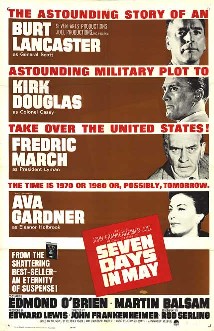Seven Days in May
| Seven Days in May | |
|---|---|

Theatrical release poster
|
|
| Directed by | John Frankenheimer |
| Produced by | Edward Lewis |
| Screenplay by | Rod Serling |
| Based on | the novel by Fletcher Knebel & Charles W. Bailey II |
| Starring | |
| Music by | Jerry Goldsmith |
| Cinematography | Ellsworth Fredricks A.S.C. |
| Edited by | Ferris Webster |
|
Production
company |
|
| Distributed by | Paramount Pictures |
|
Release date
|
|
|
Running time
|
118 minutes |
| Country | United States |
| Language | English |
| Budget | $2.2 million |
| Box office | $3,650,000 (rentals) |
Seven Days in May is a 1964 American political thriller motion picture about a military-political cabal's planned take-over of the United States government in reaction to the president's negotiation of a disarmament treaty with the Soviet Union. Directed by John Frankenheimer, it stars Burt Lancaster, Kirk Douglas, Fredric March, and Ava Gardner. The screenplay was written by Rod Serling based on the novel of the same name by Fletcher Knebel and Charles W. Bailey II, published in September 1962.
The book was written in late 1961 and into early 1962, during the first year of the Kennedy administration, reflecting some of the events of that era. In November 1961, President John F. Kennedy accepted the resignation of vociferously anti-Communist General Edwin Walker who was indoctrinating the troops under his command with personal political opinions and had described former President Harry S. Truman, former United States Secretary of State Dean Acheson, former First Lady Eleanor Roosevelt and other recent still-active public figures as Communist sympathizers. Although no longer in uniform, Walker continued to be in the news as he attempted to run for Governor of Texas and made speeches promoting strongly right-wing views. In the film version of Seven Days in May, Fredric March, portraying the narrative's fictional President Jordan Lyman, mentions General Walker as one of the "false prophets" who were offering themselves to the public as leaders. (Accused John F. Kennedy assassin Lee Harvey Oswald purportedly fired rifle shots into the home of General Walker in April 1963.)
...
Wikipedia
